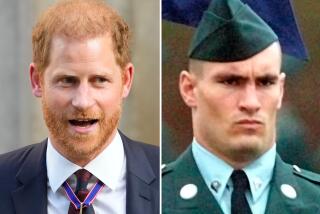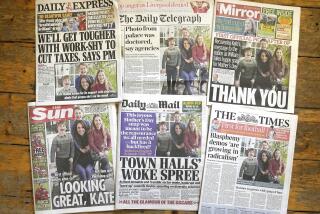Word’s out, as is Harry
- Share via
LONDON — In a news town that lives and dies by the scoop, this was one of the juiciest stories around: Prince Harry, Queen Elizabeth II’s fun-loving, redheaded grandson, was going to war on the front lines of Afghanistan.
But wait, the Ministry of Defense said. Hold off on reporting it for a while -- three long months, to be exact. You can have not only the story, but the works: interviews with the prince in his rough desert troop quarters; video of him peering at Taliban positions and man-handling a machine gun; thoughtful comments from him about how the queen gave him the news he was going to war, what it felt like to go without a royal shower for four days.
From the hallowed BBC to the raucous tabloid Sun, from the liberal Guardian to the conservative Telegraph, the news media agreed. Prince Harry would have his war in secret.
The news blackout lasted 10 weeks.
But secrets, in the end, have a short shelf life in the news business. A hint trickled out on a German website Wednesday, and by Thursday the U.S.-based website Drudge Report was all over it. “Prince Harry Fights on Frontlines in Afghanistan: 3 Month Tour,” Drudge proclaimed, sending British editors flying to remake the next day’s pages.
On Friday, the Ministry of Defense announced that Harry was coming home -- the flood of news had compromised his safety and that of his fellow troops, it said.
Following the huge splash of stories, with a gritty, camouflage-clad Harry on nearly every front page, a new skirmish broke out. Was the embargo an act of collective censorship in exchange for the right to print military propaganda at the end? Or, as the broad majority of the British public seemed to think, was a press corps former Prime Minister Tony Blair famously described as “feral dogs” exercising rare restraint?
“I was amazed it lasted as long as it did,” said Graham Dudman, managing editor of the Rupert Murdoch-owned Sun, which normally would rather chew off its own foot than make a deal along with competitors.
“This is the most fiercely competitive newspaper market in the world, and there’s nothing one paper likes more than getting one over on a rival. But in this case the line held,” Dudman said. “And that’s because you’re dealing with soldiers’ lives over there. This isn’t a story about some two-bit, here-today, gone-tomorrow celebrity. And it’s not just about Prince Harry. It’s about all the troops out there risking their lives for Britain every minute of every day. Are we to sacrifice their safety for the sake of a newspaper story? The answer was, we weren’t.”
The Sun led Friday with news of Harry’s imminent return -- “Hero Harry’s Coming Home” -- alongside a story of a man arrested in New Zealand on suspicion of attempting carnal knowledge of a goat.
Other newspapers had huge spreads, with links to slide shows and video interviews. There were accounts of the interview Harry had secretly given in London before his departure in December; stories on the prince’s emotional calls to his girlfriend; detailed accounts of Harry, a junior officer in the Household Cavalry known to his comrades as “Cornet Wales,” coordinating airstrikes for American pilots.
“Cornet Wales tells of his pride in serving country,” the Telegraph said in its upper-right-hand lead story.
The story was assembled from reports from a small pool of journalists allowed to go to Afghanistan in the wake of the expose billed as a “world exclusive” on Drudge Report.
Finger-pointing
Drudge later credited an Australian women’s magazine that had run the story in January, purportedly unaware of the embargo, and Germany’s Bild newspaper, which published a brief gossip-style item on its website Wednesday.
The Bild story “was a speculative piece, written in the subjunctive, saying that Harry hadn’t been seen for a while. We were speculating that Harry might be in Afghanistan. . . . We didn’t know that he actually is in Afghanistan, so we didn’t break any embargo,” said Katharina Hoeftmann, an editor on the paper’s foreign desk.
New Idea magazine of Australia, which published a full, “exclusive” story on the deployment Jan. 7, said in a statement it had not been aware of the embargo. “We take these matters very seriously and would never knowingly break an embargo,” the magazine said.
Drudge Report’s Matt Drudge did not respond to requests for comment.
By Friday morning, the second-guessing in London had begun.
“Can you think of any country outside China, Russia and other near-totalitarian states that would ever find every single national editor agreeing to simply facilitate the presence of somebody on the front line?” Channel 4 news presenter Jon Snow, who had been unaware of the embargo his station had agreed to, asked on his morning broadcast.
“The royal family and the army couldn’t have expected better coverage, could they?” Richard Keeble, journalism professor at the University of Lincoln, north of London, and author of a book on journalism ethics, said in an interview. “The story in Afghanistan isn’t Prince Harry. The story is that British troops should not be there, they should never have been there, and they should certainly come out now.”
But what if a news report had resulted in Harry’s capture by the Taliban, or a massive attack on his unit?
“Although it was an unusual example of self-censorship by a competitive media, I think on balance it was justified,” said Roy Greenslade, professor of journalism at City University in London. “It’s understandable that he is a target, and understandable that there should have been a blackout.”
Leading newspaper editors said in interviews that the embargo was proposed by the Ministry of Defense after the splash of stories over an earlier plan to send Harry to Iraq. They emphasized that the blackout was agreed to unanimously and voluntarily; any organization that violated it would face no punishment other than public opprobrium.
“Initially, obviously, there was distinct skepticism about the workability of such an agreement. But we talked it through collectively and agreed there was a chance it could work,” said Rhidian Wynn Davies, consulting editor at the Daily Telegraph.
“This was in no way the media collectively giving the prince an easy ride. It wasn’t something for nothing. We were given assurances, which have been borne out, that we would get access to the prince on a pooled basis, and we would be furnished with high-quality content for our newspapers and websites,” he said.
Safety concerns cited
At least two American news organizations, CNN and the Associated Press, were also party to the discussions.
“If we are in an embedded situation or something like that, we don’t disclose military maneuvers or things that would put people in danger,” said John Daniszewski, managing editor for international news at AP. “In this case it was not only a matter of the prince’s safety, but the safety of the people with him, and we just didn’t feel that it was our job to expose people to any additional hazard.”
And so, sometime in December, Harry slipped off to become the first member of the royal family in 25 years to serve in active combat. He had been scheduled to return in April.
Gen. Richard Dannatt, chief of the general staff, said he was very disappointed that foreign websites ran the story without consulting the British military, in contrast to what he called the “highly responsible” approach of those who agreed to hold back their coverage.
In the end, the prince finished the bulk of his tour of duty, and the press got their collective scoop.
“The motivation, to be honest, was the offer of what is quite frankly fantastic material,” the Sun’s Dudman said. “You’ve got footage and pictures of the third in line to the British throne firing a machine gun in anger at the Taliban!”
--
--
Special correspondent Christian Retzlaff in Berlin contributed to this report.
More to Read
Sign up for Essential California
The most important California stories and recommendations in your inbox every morning.
You may occasionally receive promotional content from the Los Angeles Times.










